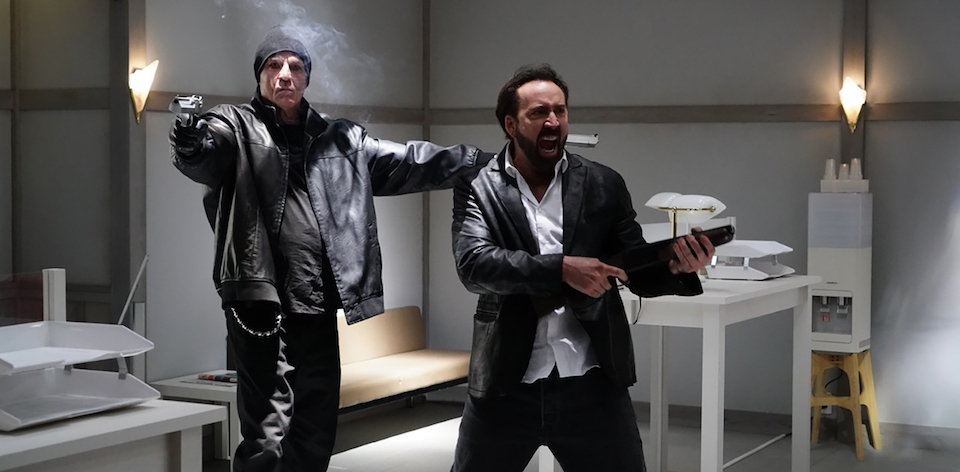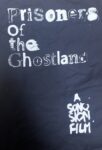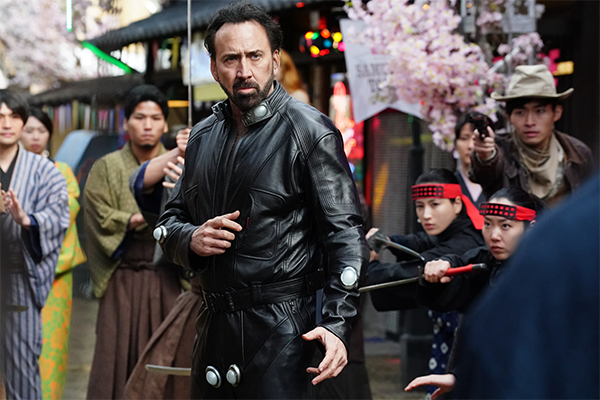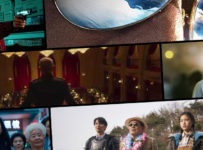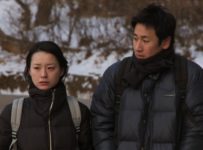The film billed as ‘Sion Sono’s first English language movie’ is a bit deceptive. Infused with a blend of future Japanese dystopia and the American west, PRISONERS OF THE GHOSTLAND is a free-flowing and multilingual adventure that crosses cultural boundaries. Yet, as a collaboration between the avant garde Sono and Nicolas Cage, it’s exactly as batshit as you’d imagine.
Following a robbery gone wrong, Hero (Cage) is held in a jail in the heart of Samurai Town. When the Governor’s (Bill Moseley) granddaughter Bernice (a kick-ass Sofia Boutella) goes missing, Hero is given temporary release in order to find her. Strapped into a leather bodysuit rigged with explosives, he only has a few days to rescue her. That is, of course, if he can unravel the mystery of the nightmarish world of the Ghostland.
Sono is, at the height of his game, one of the most interesting filmmakers working. Of course, one tends to base that on the best in his catalogue (the four-hour Love Exposure), or when he is at his indulgent and refined Sono-est. Working with a script from Aaron Hendry and actor Reza Sixo Safai (A Girl Walks Home Alone at Night), the film is unmistakably a continuation of a filmography that includes Shinjuku Swan and Tokyo Vampire Hotel.
For a filmmaker so closely associated with an intrinsically Japanese outlook, the styles and excesses of PRISONERS OF THE GHOSTLAND initially feel like an outsider looking in. This is partly the result of the non-Japanese screenwriters but also a matter of aesthetic. From its tips to its toes, Samurai Town has the look and feel of a Japanese theme park. Bright neon is interfiled with the trappings of a Western, albeit one where seemingly disembodied singing heads jut out of a red sign. It’s Westworld by way of Dead-End Drive-In, mixed with a dash of Mika Ninagawa’s hyperreal set design, bottled in something akin to Osaka’s Americamura and served with a twist of post-apocalyptic lemon.
Which might explain why the whole thing feels a bit like a ride in a messed-up amusement park. Leaping from one thing to the next, little time or energy is spent reconciling the joyride Bernice is taking in the opening scenes with the nuclear wasteland she wakes up in a moment later. The people of the Ghostland hold back the hands of a clock with a rope, convinced that time moving forward will be the end of them all. Beautifully choreographed swordplay sits alongside a Greek chorus recounting days of future past. It’s either the work of inspired genius or utter madness, or perhaps just a little of each.
Amidst this confluence of stylistic influences and visual panache, the film is occasionally a prisoner of its own Ghostland. The titular nightmare world is thinly defined, often feeling like it is only physically just up the road from Hero’s starting point. As such, the stakes feel relatively low for the vague End Times plotting, and other bits go entirely unexplained. Women being hidden inside mannequins don’t really need detailed notes, especially if we see much of this as Sono’s trademark abstraction. Just don’t expect it to make literal sense.
“You are the greatest and most powerful clock.”
Of course, none of this matters because this is also a Nicolas Cage film. Reading lines as only he could, the actor takes healthy bites out of the stylised backdrops. There is nobody else on the planet who could say ‘testicle’ in quite the same way as the man assigned the name Nicolas Kim Coppola. As the film comes careening into mutant sword arm territory (echoing the body horror of the Sono-penned Tokyo Gore Police), Cage is clearly revelling in every second of his time in the Sonoverse.
Names more familiar to fans of Japanese cinema pepper the rest of the cast. Tak Sakaguchi, who wowed in his ‘one-take’ action film Crazy Samurai Musashi (also written by Sono), delivers similarly slick swordplay here. Yuzuka Nakaya, who came to prominence in Sono’s The Forest of Love (2019), serves a prominent role as Bernice’s sister.
As Sono slows down to a respectable two or three films a year, partly thanks to the emergency heart surgery he underwent during production, the now 59-year-old filmmaker shows no signs of letting up on his creativity. While this may not be the greatest Sono in the canon, it’s a great example of how his voice can successfully transition with something resembling western aesthetics. Although as Sono’s legion of fans around the world will attest, it’s hard to keep this prolific filmmaker in a single stylistic prison.
2021 | USA | DIRECTOR: Sion Sono | WRITERS: Aaron Hendry, Reza Sixo Safai | CAST: Nicolas Cage, Sofia Boutella, Nick Cassavetes, Ed Skrein, Bill Moseley, Yuzuka Nakaya, Tak Sakaguchi | DISTRIBUTOR: RLJE Films, Fantastic Film Festival Australia | RUNNING TIME: 103 minutes | RELEASE DATE: 16-30 April 2021 (FFFA)

